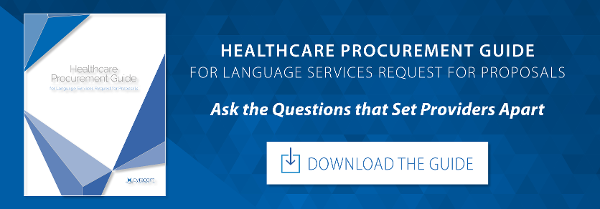
It's been three years since Health and Human Services' final order on Section 1557 of the Affordable Care Act took effect. US healthcare providers have worked hard to meet the language access requirements that Section 1557 lays out.
Has your organization achieved compliance with the interpretation and translation requirements found in Section 1557 of the Affordable Care Act? Here are four questions to consider:
1. Is your organization bound by Section 1557?
Section 1557 doesn’t impact every healthcare organization, but most providers will find themselves impacted. The Department of Health and Human Services issued a ruling for clarification, explaining that the law applies to healthcare organizations and programs that:
- Receive federal funding (such as hospitals or doctors that accept Medicare/Medicaid). Excludes Medicare Part B
- Are administered by the HHS itself (such as Medicare Part D)
- Participate in Health Insurance Marketplaces
Section 1557 also requires providers to post a notice of nondiscrimination and taglines (short statements advising language services are available) in the state’s/hospital’s top 15 languages.
Find your top 15 languages by downloading Health and Human Services’ PDF. Then download HHS’s free translated taglines, available in 64 languages. CyraCom clients can contact their account manager or client services for access to customizable language notification posters with more than 100 languages and translations available.
2. Are all of the interpreters you use qualified?
Section 1557 requires bilingual staff who act as interpreters to have interpreting listed as part of “the individual’s current, assigned job responsibilities.” Staff members must also demonstrate:
- “[Proficiency] in speaking and understanding both spoken English and at least one other spoken language, including any necessary specialized vocabulary, terminology, and phraseology.”
- “[Ability] to effectively, accurately, and impartially communicate directly with individuals with limited-English proficiency in their primary languages.”
Demonstrating these skills may require interpreter training, testing, or certification. CyraCom offers staff testing and training for staff interpreters, as well as bilingual doctors and nurses who wish to interpret. We test both language proficiency and interpreter skills.
3. Do you allow patients’ families and friends to act as their interpreters?
Providers sometimes turn to patient family and friends to interpret because it’s convenient – often, they’re already present. But emotional involvement and a lack of formal interpreter training may impact accuracy and ability.
For that reason, Section 1557 specifies that providers should not rely on:
- A patient’s minor children (except in emergencies to prevent imminent patient harm)
- Adult family and friends (unless the patient refuses an interpreter – provider may still utilize an interpreter if they determine the family member/friend cannot interpret adequately)
4. Are your video interpretation options effective?
HHS’s ruling supports using qualified phone and video interpreters to help providers deliver timely language access to their LEP patients.
The ruling also establishes quality standards for video interpretation, linking it to standards set for ASL interpretation by the Americans with Disabilities Act, including:
a. “Real-time, full-motion video and audio over a dedicated high-speed, wide-bandwidth video connection or wireless connection that delivers high-quality video images that do not produce lags, choppy, blurry, or grainy images, or irregular pauses in communication.
b. A sharply delineated image that is large enough to display the interpreter’s face, arms, hands, and fingers, and the participating individual’s face, arms, hands, and fingers, regardless of his or her body position.
c. A clear, audible transmission of voices.
d. Adequate training to users of the technology and other involved individuals so that they may quickly and efficiently set up and operate the VRI.”
CyraCom’s unified phone and video interpretation solutions comply with all Section 1557 requirements.
Want a more complete look at the steps CyraCom takes to provide qualified, professional interpreters in secure environments? Download our CyraCom RFP Guide to learn more.










